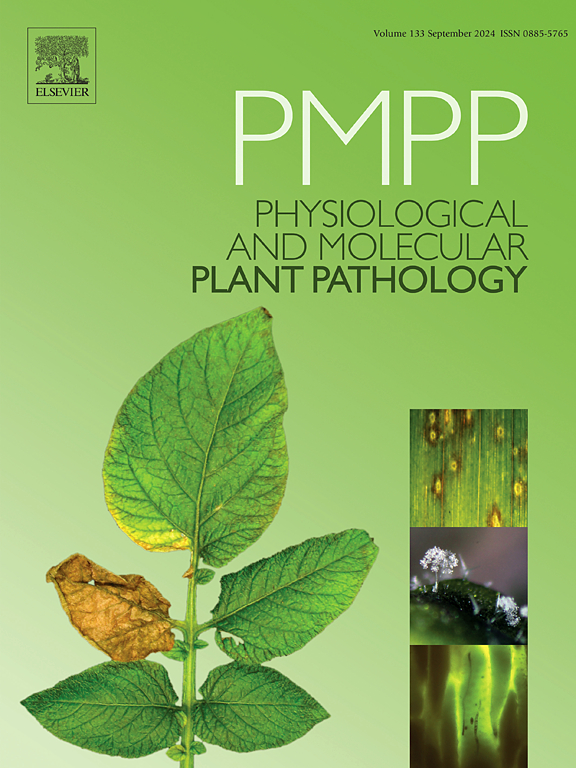利用植物生长的生物防治潜力,促进芽孢杆菌类控制植物病原真菌
IF 3.3
3区 农林科学
Q2 PLANT SCIENCES
引用次数: 0
摘要
根据最近的调查,植物病原真菌的危害正在增加,在世界范围内给农作物造成了重大的经济损失。自20世纪40年代以来使用的化学杀菌剂对环境和生物产生了负面影响,在某些情况下真菌产生了抗药性。最有效的替代方法之一是生物防治,即利用与植物相关的细菌或生物化合物。促进植物生长的根瘤菌,如芽孢杆菌,可以促进植物生长和健康,同时也保护它们免受真菌疾病的侵害,使它们成为化肥和农药的潜在替代品。芽孢杆菌可以形成孢子,在恶劣的环境中存活很长时间。然而,芽孢杆菌的生物防治能力尚未得到充分认识,需要在这一领域进行广泛的研究,以了解实验室的发现并将其应用于现实世界。本文综述了芽孢杆菌作为植物生长促进剂的作用、芽孢杆菌对植物真菌病原菌的生物防治机制以及芽孢杆菌如何提高作物产量。此外,本文重点介绍了芽孢杆菌抗真菌机制的基因组和分子见解,同时也为其在农业实践中发挥诱导系统抗性的应用过程提供了详细指导。它还确定了知识空白和进一步研究的领域,以改进可产生诱导全身抗性的芽孢杆菌生物防治剂。本文章由计算机程序翻译,如有差异,请以英文原文为准。
Exploiting the biocontrol potential of plant growth promoting Bacillus species to control plant pathogenic fungi
According to recent investigations, the harmful effects of plant pathogenic fungi are increasing, causing significant economic losses to crops worldwide. Chemical fungicides utilized since 1940s have negative consequences for the environment and living organisms, and fungal resistance is developed in some cases. One of the most effective alternatives is biological control, which utilises plant-associated bacteria or biological compounds. Plant growth-promoting rhizobacteria, such as Bacillus species, can enhance plant growth and health while also protecting them against fungal diseases, making them a potential alternative to chemical fertilizers and pesticides. Bacillus species can form spores that survive in harsh environments for long periods. However, the biocontrol abilities of Bacillus species have not been fully realized, and extensive research in this field is required to understand and transfer lab findings to real-world applications. This review explores the role of Bacillus species as a plant growth-promoting agent, its mechanisms of biocontrol against fungal phytopathogens, and how it can improve crop productivity. Additionally, this review highlights the genomic and molecular insights into the antifungal machinery of Bacillus species, while also providing detailed guidance on its application process to exert induced systemic resistance in agricultural practices. It also identifies knowledge gaps and areas for further research to improve Bacillus-based biocontrol agents that can exert induced systemic resistance.
求助全文
通过发布文献求助,成功后即可免费获取论文全文。
去求助
来源期刊
CiteScore
4.30
自引率
7.40%
发文量
130
审稿时长
38 days
期刊介绍:
Physiological and Molecular Plant Pathology provides an International forum for original research papers, reviews, and commentaries on all aspects of the molecular biology, biochemistry, physiology, histology and cytology, genetics and evolution of plant-microbe interactions.
Papers on all kinds of infective pathogen, including viruses, prokaryotes, fungi, and nematodes, as well as mutualistic organisms such as Rhizobium and mycorrhyzal fungi, are acceptable as long as they have a bearing on the interaction between pathogen and plant.

 求助内容:
求助内容: 应助结果提醒方式:
应助结果提醒方式:


